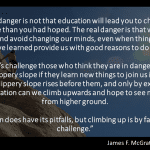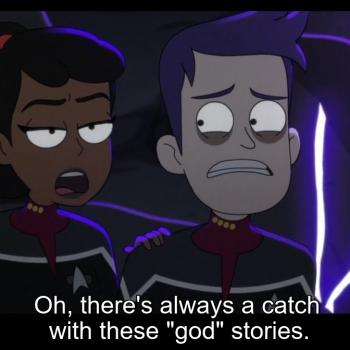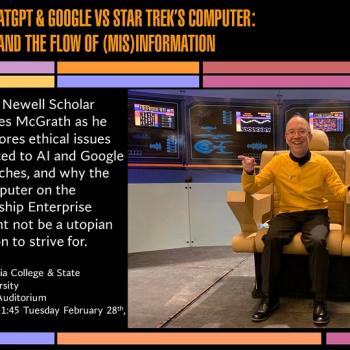You probably remember how, during the first season of Star Trek: Discovery, the news circulated that characters were not even allowed to say “God” on the show. That this turned out not to be the case as a rule was appropriate, since the second pilot of TOS witnessed Capt. Kirk pontificating about the attributes of a deity. With that as the starting point, it is perhaps especially fitting that the final season of Discovery has had a spiritual focus.
The last season of Discovery focused on a search for technology from the Progenitors, that race that appeared in the Next Generation episode “The Chase.” They found themselves alone in the universe and decided to seed it with intelligent life made in their own image. Of course, the notion that they were truly alone would contradict the abundance of “life but not as we know it.” The suggestion is made that they emerged too early to find any other life like themselves and were destined to fade before other sentient life evolved, and so they left the seeds of life in their image behind as their legacy. This detail provides an in-show explanation for what the limits of costuming explains in the real world, namely why there are so many humanoid species in the galaxy. There were hints of this idea all the way back in the Original Series.
The whole final season of Discovery is thus a quest for the creators, which if not a quest for God in the monotheistic sense is nonetheless a quest for the gods, or in technical terms the demiurges, the lesser deities directly involved in creation within and already-existing universe.
In the episode “Mirrors” Hugh talks with Tilly about the way the spiritual and not fully graspable aspects of their experiences in that season are impacting them.
Tilly: It sounds like he’s not the only one who hates the unknown.
You should talk to somebody about that.
[chuckles]
They’re not really that far apart.
The intellectual and the spiritual.
Both reach for understanding.
Both bring us to new places.
Hugh: But I didn’t say “spiritual.”
Tilly: Yeah, Hugh, you kind of did.
The episode “Whistlespeak” also explored religious themes, although there it was the classic trope of advanced technology being misunderstood in religious terms that cause harm to innocent people whose lives are sacrificed to the superstition.
In the end, it turned out that the Progenitors (rather like the beings that communicated with Dr. Ellie Arroway in Contact) had not invented their life-seeding technology but had found it. That’s why I called this post “progenitors all the way down.” Within the universe we can always imagine some sentient life that decided to seed another world, such as ours. Think of the Engineers in Alien: Prometheus. Or think of Guardians of the Galaxy Vol.3 with the hand that created Rocket, and the hand that made the hand.
I loved that Dr. Kovich was revealed to be none other than a much older Agent Daniels, the time agent who appeared in Enterprise.
The ending made for a connection with the until now puzzling short “Calypso.”
The whole series seems to have had as its overarching theme, at least since the second season, when Captain Pike shared in the episode “New Eden” that theologians had adapted Arthur C. Clarke’s famous third law into “any sufficiently advanced extraterrestrial entity is indistinguishable from God.” The characters did not all align on such matters but discussed them and engaged with them in interesting ways which is better still.
As a (hopefully amusing) concluding anecdote, I told a colleague about my post about the Discovery finale, and did not realize at the time that the post was still languishing as a draft. My apologies to readers that you had to wait until now to read my thoughts about the way Star Trek Discovery wrapped up.
What did you think of Star Trek: Discovery as a whole? Please share your thoughts!












